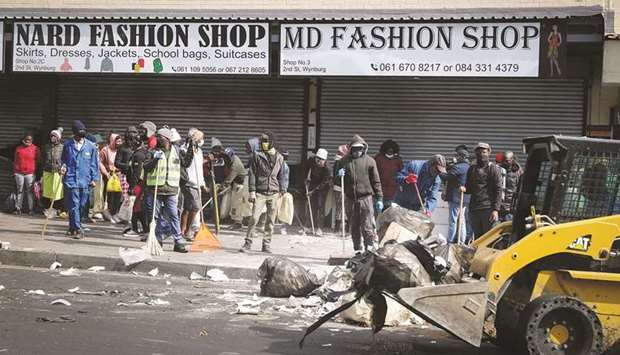South Africans counted the cost of arson and looting that has destroyed hundreds of businesses and killed at least 70 people as the spasm of violence began to ebb yesterday.
Pockets of unrest remained, notably in the port city of Durban, where looters again pillaged shops and racial tensions flared.
But in the main commercial city Johannesburg, shopkeepers and other residents sifted through debris, cleared up trash and assessed what remained of their ruined enterprises.
Also yesterday, the military called up all its reservists to bolster army and police who have struggled to contain the unrest.
Defence Minister Nosiviwe Mapisa-Nqakula said on Wednesday she wanted to deploy up to 25,000 soldiers in KwaZulu-Natal and Gauteng provinces, which bore the brunt of the several days of violence.
About 5,000 troops are already on the streets, authorities said, and security forces have so far arrested at least 1,350 people.
The rioting first broke out in response to the jailing of ex-president Jacob Zuma last week for his failure to appear at a corruption inquiry.
It swiftly degenerated into looting and destruction, driven by widespread anger over the hardship and inequality that nearly three decades of democracy since the end of apartheid have failed to address.
In some neighbourhoods, vigilante groups have sprung up to protect their property.
But there was also evidence the latest chaos may be exacerbating the racial tensions that are a legacy of the apartheid system.
In Durban’s Phoenix neighbourhood, home to many South Africans of Indian descent, authorities reported conflict between them and Black citizens.
“There are ugly scenes playing out on the streets of Phoenix, the racial direction that these unrests are taking must be arrested speedily,” Police Minister Beki Cele said.

Residents clean rubble and debris after protests and unrest linked to the jailing of former president Jacob Zuma, in Johannesburg, South Africa, yesterday.
